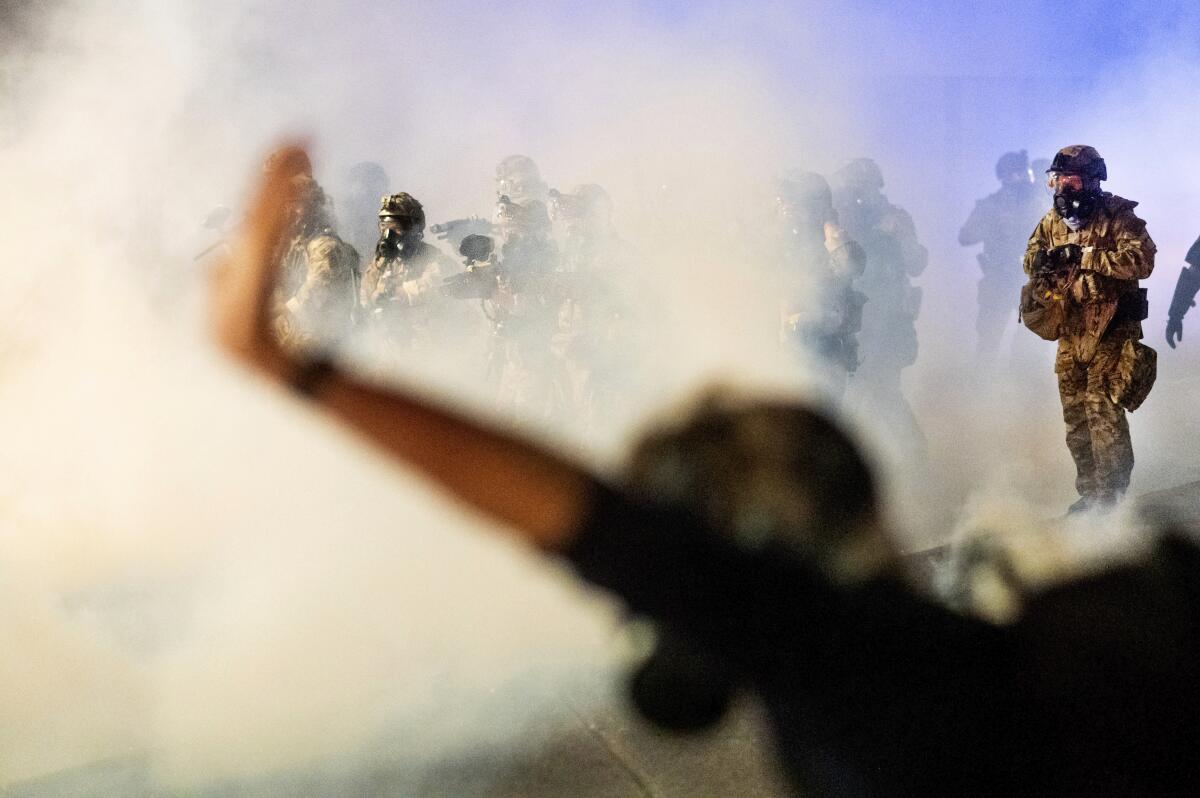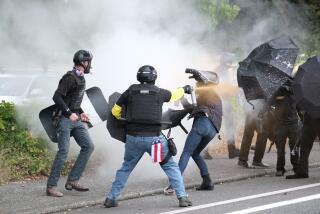Federal agents use tear gas again, wade into street to try to disperse Portland protests

- Share via
PORTLAND, Ore. — Thousands of protesters, among them military veterans and organized groups of teachers, healthcare workers and lawyers, gathered outside the federal courthouse in downtown Portland, Ore., into the early hours Saturday, undeterred by volleys of tear gas, incendiary rounds and sting-ball grenades hurled by federal agents.
As in other recent nights, the crowd, protesting the presence of the agents sent by the Trump administration despite the pleas of local officials, included a “Wall of Moms.”
Also, as in recent nights, the federal agents, who first responded to protesters setting off fireworks by tossing tear gas canisters from beyond a protective fence, left the perimeter of the Mark O. Hatfield U.S. Courthouse and walked onto the streets to clear the crowd. They also extinguished a fire that had been set in the street outside the courthouse.
Some protesters retreated up the block where they were met by volunteers who administered saline solution to their eyes. But hundreds set off more fireworks in response.
Portland has been roiled by nightly protests for two months following the killing of George Floyd by Minneapolis police. President Trump said he sent federal agents to Oregon’s largest city to halt the unrest, but state and local officials say they are making the situation worse.
In recent days, many of the protesters have come prepared, wearing gas masks, helmets and goggles. Some bring leaf blowers to direct the tear gas back toward the federal agents.
A few agents early Saturday were spotted armed with their own leaf blowers. That the agents had adapted the same tactic made some protesters laugh.
“That’ll buy you a few minutes,” a protester told a federal agent who had just tossed a tear gas canister from behind the fence into the crowd. “But we aren’t going anywhere.”
The clashes in Portland have further inflamed the nation’s political tensions and triggered a crisis over the limits of federal power as Trump moves to send U.S. officers to other Democratic-led cities he says are violent.
Late Friday, a federal judge denied a request by Oregon’s attorney general to restrict the actions of federal police.
The Federal Protective Service had declared the gathering in Portland that began Friday evening as “an unlawful assembly” and said that officers had been injured.
As the crowd dispersed, a person was found stabbed nearby, Portland police said. The person was taken to a hospital and a suspect was taken into custody.
By 3 a.m., most demonstrators had left, with only some small groups roaming the streets.
Daniel Pereyo was one protester who was tear-gassed.
Pereyo said he had been at the nearby park listening to drummers and watching fireworks being shot, when his face and eyes began to burn.
“It’s extremely painful,” he said. “It’s not the worst pain ever, but it is discomforting and it’s distracting.”
As the clouds of gas floated down the street, protesters would swiftly regroup and return to chant and shake the fence that separates people on the street from federal agents and the courthouse.
It was unclear whether anyone was arrested during Friday’s protest. The federal agents have arrested dozens during nightly demonstrations against racial injustice that often turn violent.
The state attorney general sued, objecting that some people had been whisked off the streets in unmarked vehicles. U.S. District Judge Michael Mosman ruled Friday that the state lacked standing to sue on behalf of protesters because the lawsuit was a “highly unusual one with a particular set of rules.”
The state was seeking a restraining order on behalf of its residents not for injuries that had already happened but to prevent injuries by federal officers in the future. That combination made the standard for granting such a motion very narrow, and the state did not prove it had standing in the case, Mosman wrote.
Legal experts had warned that the judge could reject the case on those grounds. A lawsuit from a person accusing federal agents of violating their rights to free speech or against unconstitutional search and seizure would have a much higher chance of success, Michael Dorf, a constitutional law professor at Cornell University, said ahead of the ruling.
“The federal government acted in violation of those individuals’ rights and probably acted in violation of the Constitution in the sense of exercising powers that are reserved to the states, but just because the federal government acts in ways that overstep its authority doesn’t mean the state has an injury,” he said.
The lawsuit from Oregon Atty. Gen. Ellen Rosenblum accused federal agents of arresting protesters without probable cause and using excessive force. She sought a temporary restraining order to “immediately stop federal authorities from unlawfully detaining Oregonians.”
David Morrell, an attorney for the U.S. government, called the motion “extraordinary” and told the judge in a hearing this week that it was based solely on “a few threadbare declarations” from witnesses and a Twitter video. Morrell called the protests “dangerous and volatile.”
Rosenblum said the ramifications of the ruling were “extremely troubling.”
“Individuals mistreated by these federal agents can sue for damages, but they can’t get a judge to restrain this unlawful conduct more generally,” Rosenblum said in a statement.
Acting Homeland Security Secretary Chad Wolf denied that federal agents were inflaming the situation in Portland and said Wheeler legitimized criminality by joining demonstrators, whom Trump has called “anarchists and agitators.”
Wolf said Tuesday that at least 43 people have been arrested on federal charges at that point. Charges included assaulting federal officers, arson and damaging federal property, U.S. Atty. Billy J. Williams said. All the defendants are local and were released after making a court appearance.
Times staff writer Melissa Etehad contributed to this report .
More to Read
Sign up for Essential California
The most important California stories and recommendations in your inbox every morning.
You may occasionally receive promotional content from the Los Angeles Times.










